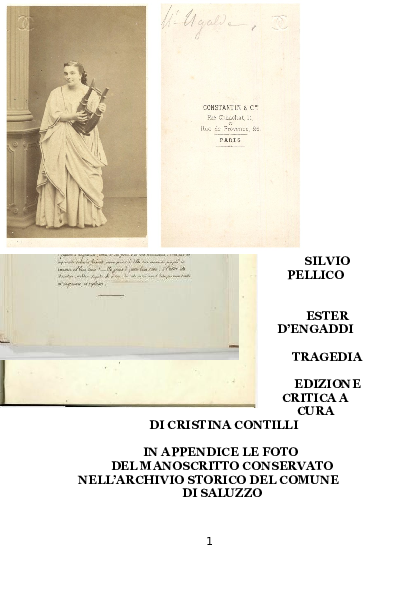File:1821 Pellico (play).png
1821_Pellico_(play).png (420 × 595 pixels, file size: 153 KB, MIME type: image/png)
{it} Ester d'Engaddi / Esther of Engaddi (1821) is a play by Silvio Pellico.
Abstract
A tragedy in five acts by the Italian patriot and writer. The setting is a remote area of Israel where a group of Jewish refugees lives, around 50 years after the destruction of the Temple.
Pellico reverses his present-day's situation; the Christians are the oppressed minority, while the Jews are the majority, ruled by a corrupted High Priest.
The heroine Ester is a Jewess. She is the faithful wife of Azaria, the champion of the Jews in their resistance against the Romans, while her father Eleazaro has been banned as he converted to Christianity.
The tragedy focuses on the plot of the High Priest, Jefte, who slanders and eventually poisons Ester for having rejected his love, while the faithful Ester steadily maintains her loyalty to both her father and husband.
Ester reproaches his father for despising the Jews:
"Agl’idoli empi / non immolar, dritto e’ ma qui mentito / Dio non s’ adora: e (qual pur fosse il Giusto, / che in Golgota moria) de’ giusti il rege / altro esser può che di Giacobbe il Dio?"
With similar world she reproaches the Jews for despising her father:
"Rispettate i suoi giorni; altra è sua legge, / altre le preci ma sol uno è il Dio!"
Ester asks herself: "Dio di Giacobbe, perche' delle tue sante are ministra esser permetti iniquita'? Ritolto dal popol tuo gli sguardi avresti? e novo a te fatto popol, della Croce i figli? Vero saria?". Yet she does not convert.
Ester: "Abbominando e' questo altar... Piu' Dio con Israel non e'." Azaria: "Che intendo? al novo culto forse delira?" [...] "Or dianzi, vaneggiando. mi ti svelavi: adoratrice occulta fatta ti sei del nazareo Profeta!". Ester: "Religion paterna e': mal m'e' nota. Ma, e' ver, la onoro -- e piu', dacche' all'altare d'Israel veggio iniquita' ministra".
Ester dies but not before the entire people reconcile with Eleazaro and call him: "Fratello nostro (our brother)! Sia salvo! Morte a Jefte!". (Azaria kills the evil High Priest Jefte). Both Azaria and Eleazar ends in despair.
The ending is ambiguous. Nobody converts but the Jewish law is not presente in a positive light. The killing of Jefte means the end of Judaism and the triumph of Christianity (?), or through the sacrifice of Ester, Christians and Jews learn how to live together as worshipers of the same God (?).
- Gabriele Boccaccini, University of Michigan
Editions, performances
Premiered in Turin, Italy: 1838.
Translations
Adaptations
External links
File history
Click on a date/time to view the file as it appeared at that time.
| Date/Time | Thumbnail | Dimensions | User | Comment | |
|---|---|---|---|---|---|
| current | 04:26, 30 July 2022 |  | 420 × 595 (153 KB) | Gabriele Boccaccini (talk | contribs) |
You cannot overwrite this file.
File usage
There are no pages that use this file.
- 1821
- Fiction--1800s
- Fiction--Italian
- Literature--1800s
- Plays
- Italian language--1800s
- Made in the 1820s
- Second Temple Studies--1800s
- Second Temple Studies--Fiction
- Second Temple Studies--Italian
- Christian Origins Studies--1800s
- Christian Origins Studies--Fiction
- Christian Origins Studies--Italian
- Italian Jewish Studies--1800s
- Italian Jewish Studies--Italian
- Fiction, Jews Italy (subject)
- Literature, Jews Italy (subject)
- Literature, Jews Italy, Works (subject)
- Esther of Engaddi (subject)
- Esther of Engaddi--fiction (subject)
- Esther of Engaddi--theatre (subject)
- Rabbinic origins (subject)
